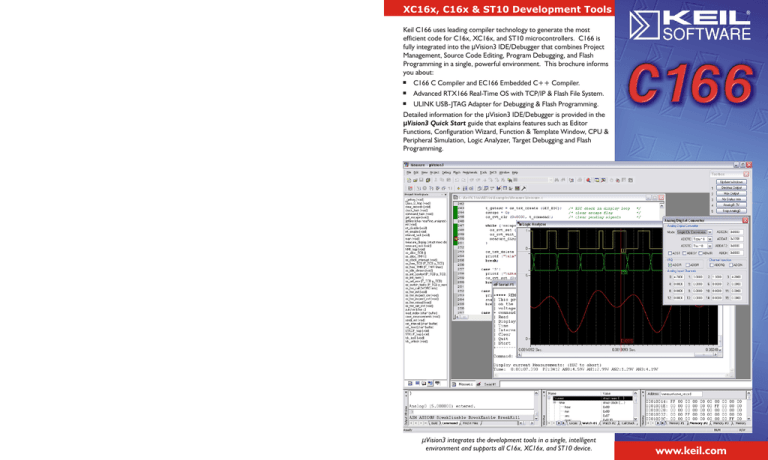
XC16x, C16x & ST10 Development Tools
®
Keil C166 uses leading compiler technology to generate the most
efficient code for C16x, XC16x, and ST10 microcontrollers. C166 is
fully integrated into the µVision3 IDE/Debugger that combines Project
Management, Source Code Editing, Program Debugging, and Flash
Programming in a single, powerful environment. This brochure informs
you about:
+ C166 C Compiler and EC166 Embedded C++ Compiler.
+ Advanced RTX166 Real-Time OS with TCP/IP & Flash File System.
+ ULINK USB-JTAG Adapter for Debugging & Flash Programming.
Detailed information for the µVision3 IDE/Debugger is provided in the
µVision3 Quick Start guide that explains features such as Editor
Functions, Configuration Wizard, Function & Template Window, CPU &
Peripheral Simulation, Logic Analyzer, Target Debugging and Flash
Programming.
µVision3 integrates the development tools in a single, intelligent
environment and supports all C16x, XC16x, and ST10 device.
www.keil.com
C166 Compiler - Version 5
The ANSI standard Keil C166 compiler is
specifically designed for the XC16x, C16x,
and ST10 microcontroller families.
Extensions incorporated into the compiler
support all resources of your embedded
hardware and allow efficient access to
interrupts, register banks, SFRs, and
memory spaces.
Configuration Wizard
The µVision3 configuration wizard simplifies
editing the startup code (and many other
configuration files). A graphical interface
helps you quickly select the options that
match your target system and easily spot
potential startup problems.
Embedded C++
Keil C166 Version 5 includes an efficient
Embedded C++ compiler. EC++ is a
new, evolving C++ standard for embedded
systems that avoids the overhead involved
with C++ programming. The Keil EC++
implementation includes numerous
166-specific language extensions.
The Configuration Wizard provides a graphical editor for startup files,
In-Line Assembly
A new, updated in-line assembler enables
you to insert assembly instructions directly
into your program and offers:
+
+
+
Access to C program variables by name,
C-level debugging information (sourcelevel and symbolic),
Optimized MAC instruction utilization.
Function In-lining
Functions defined with the __inline
attribute are directly embedded when called
(CALL and RET instructions are no longer
required). Parameters are accessed directly
(they are not passed in special registers or
stored on the stack) by the generated code.
Accurate Device Simulation
The µVision3 Debugger accurately simulates
all on-chip peripherals and has debug dialogs
that help you rapidly test 166 applications.
2
XC16x, C16x, & ST10 Development Tools
The µVision3 Debugger provides debug dialogs and accurate simulation
of on-chip peripherals. A/D converters, CAN, TwinCAN, CAPCOM, ASC,
SSC, PWM, PEC, Timers, Watchdog, and I/O Ports are all fully simulated.
.
RTX166 - Real Time Operating Systems
Keil provides two Real-Time Operating
Systems for the 166 family. Both support all
device variants, are royalty-free, and are
fully integrated into the C166 toolchain.
Each RTOS uses standard 166 stacks (so no
overhead is added to your C code). Neither
requires a special run-time library.
RTX166 Tiny is an easy-to-use kernel that
is part of the C166 package. It is designed
for simple real-time programs that do not
require much inter-task communication.
Advanced RTX166 (ARTX166) is a fullfeatured kernel with task priorities, roundrobin, preemptive context switching, and
support for multiple instances of the same
task function. It also includes a Flash file
system and TCP/IP network support.
Advanced RTX166 Function Overview
+ Task Management functions allow you to define and remove tasks.
ARTX166 allows multiple instances of the same task.
+ Event Flag Management for task synchronisation based on up to
16 event flags.
+ Semaphore Management for efficient resource sharing.
+ Mailbox Management for inter-task communication.
+ Time Management use for task delays (interval or timeout).
+ User Timer Management allows definition of callback functions
which are called after a time delay.
+ Flash File System functions for file-based data access in Flash ROM
and RAM devices.
+ BSD Socket functions for network communication.
Flash File System
The Flash File System allows you to create,
save, read, and modify files stored in Flash
memory. It provides file access functions
(fopen, fread, fwrite, fgets, fprintf, ...) and
may be configured for various Flash devices.
TCP/IP Network Support
The TCP/IP stack in ARTX166 is a groundup implementation specifically designed for
embedded applications. It includes the
following protocols:
+
+
+
TCP, UDP, PPP, SLIP, IP, ARP.
HTTP Web Server and FTP Server.
DHCP Client.
ARTX166 helps you create embedded
TCP/IP solutions that connect to standard
internet browsers. It is pre-configured for
the Keil MCB-XC167-NET and MCB167NET evaluation boards and includes
examples you may use to quickly get started
with your own internet-enabled projects.
,
Applications with numerous web pages, FTP
files, or dynamic content may use the Flash
File System to store HTML and data files.
Flash System Files are added to the µVision3
project and automatically converted and
stored in the final object file.
ARTX166 dialogs in the µVision3 Debugger support kernel-aware
debugging and provide detailed task and system status.
Technical Data
Advanced RTX166
RTX166 Tiny
Number of tasks
Number of mailboxes
Number of semaphores
Number of signals
Number of user timers
256 maximum
Unlimited
Unlimited
16 Event Flags per task
Unlimited
32 maximum
Not supported
Not supported
1 per task
Not supported
RAM Requirements
Code requirements
Hardware Requirements
Minimum 2-3 KB
Less than 4 KB
One timer
8 + 4 * tasks Bytes
Less than 1.5KB
One timer
User task priorities
Context switch time
256
Less than 25 µsec.
0.2 µsec.
Not supported
40-100 µsec.
Less than 4 µsec.
Interrupt lockout time
Timings are based on C167CR running at 20MHz with no waitstates.
3
Advantages of Keil C166 and µVision3
Benefit
Feature
The C166 Compiler is highly optimized. In-line functions
give you the fastest execution speed. In-line assembly
allows optimized MAC instruction sequences.
There is almost no size or speed penalty when using Keil
C166. DSP algorithms using the MAC unit may be
directly written as C functions.
Embedded C++ Compiler includes specific compiler
extensions for the 166 architecture.
EC++ allows you to write object-oriented programs
while avoiding the overhead of the C++ language.
The µVision3 Simulator is the only debugger that
You may write and test application code before
accurately simulates all on-chip peripherals of the Infineon production hardware is available. Investigate different
C16x/XC16x and ST10 devices.
hardware configurations to optimize the hardware design.
The µVision3 Device Database automatically configures
the development tools for the target microcontroller.
Mistakes in tool settings are practically eliminated and
tool configuration time is minimized.
The µVision3 IDE integrates third-party tools like SVCS,
CASE, and FLASH/Device Programming.
Quickly access development tools and third-party tools.
All configuration details are saved in the µVision3 project.
Identical Editor, Debugger, and Simulator Interfaces.
No need to learn different tool interfaces.
Advanced RTX166 is a full-featured, high-performance
Real-Time Operating System that incorporates TCP/IP
networking and a Flash File System.
Allows you to implement complex, time-critical
applications that can be easily connected to the Internet
and accessed using a standard web browser.
ULINK USB-JTAG Adapter
The ULINK USB-JTAG Adapter connects
µVision3 to the On-Chip Debugging
System (OCDS) of the XC16x, C161U,
C165UTAH, or C165H device. ULINK
allows you to:
+ Download target programs.
+ Examine memory and registers.
+ Single-step through programs.
+ Insert multiple breakpoints.
+ Run programs in real-time.
+ Program on-chip FLASH.
ULINK connects the PC USB Port to the OCDS Interface of the C16x or
XC16x device (in this case the Keil MCB-XC167 NET board).
Keil Elektronik GmbH and Keil Software, Inc., have representatives in the following countries:
Australia, Austria, Belgium, Brazil, Canada, China, Czech, Denmark, Finland, France, Germany, India, Ireland, Israel, Italy, Japan, Korea, Malaysia, Mexico, Netherlands,
New Zealand, Norway, Poland, Portugal, Russia, Romania, Singapore, Slovenia, Slovakia, Spain, South Africa, Sweden, Switzerland, Taiwan, Turkey, Thailand,
United Kingdom, and United States.
4
Europe:
United States:
Keil Elektronik GmbH
Bretonischer Ring 15
85630 Grasbrunn
Germany
Phone
++49 89 / 45 60 40 - 0
Support
++49 89 / 45 60 40 - 24
FAX
++49 89 / 46 81 62
Email
sales.intl@keil.com
support.intl@keil.com
Keil Software, Inc.
1501 10th Street, Suite 110
Plano, Texas 75074
USA
Phone
800-348-8051
972-312-1107
FAX
972-312-1159
Email
sales.us@keil.com
support.us@keil.com
XC16x, C16x, & ST10 Development Tools
®
www.keil.com
Copyright © 1992-2004 Keil Elektronik GmbH & Keil Software, Inc. All rights reserved.
Information in this data sheet is subject to change without notice.



